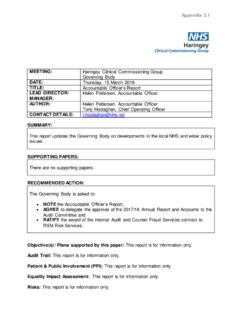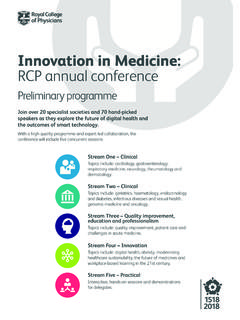Transcription of Appendix 4.1 MEETING: DATE: LEAD DIRECTOR
1 Appendix MEETING: Haringey Clinical Commissioning Group Governing Body Meeting DATE: Thursday, 15 March 2018. TITLE: Operating Plan: Timetable and Governance LEAD DIRECTOR : Alex Smith, DIRECTOR of Planning, Performance and Delivery, Haringey and Islington CCGs Anthony Browne, Deputy DIRECTOR of Finance, Haringey and Islington CCGs AUTHOR: Paul Sinden, NCL DIRECTOR of Performance and Acute Commissioning Alex Smith, DIRECTOR of Planning, Performance and Delivery, Haringey and Islington CCGs CONTACT DETAILS: SUMMARY: Planning guidance for 2018/19 was received from NHS england on 2 February 2018. This paper sets out the timetable and suggested governance process for the Operating Plan refresh for 2018/19.
2 SUPPORTING PAPERS: None. RECOMMENDED ACTION: The Governing Body is asked to NOTE the contents of this report and APPROVE the suggested Operating Plan sign off mechanism for 2018/19. Objective(s) / Plans supported by this paper: The Operating Plan for 2018/19 will support delivery of: The North Central London Sustainability and Transformation Plan;. CCG priorities including joint commissioning priorities with Local Authorities;. Audit Trail: N/A. Patient & Public Involvement (PPI): There was no patient involvement in this paper. Risks: The main risks to generating plans for 2018/19 within CCG resource envelopes are: Delivery of the targeted activity reductions and cost savings from STP interventions and local QIPP in 2017/18.
3 Developing further QIPP and STP interventions proposals for 2018/19;. Triangulation of CCG and Trust views on 2017/18 forecast outturn and the impact of 2018/19 Sustainability and Transformation Plan workstream interventions;. Ensuring agreements in two-year contracts for 2017/18 and 2018/19 signed in December 2016 are carried forward from 2017/18 into 2018/19. Resource Implications: There are no additional resource implications. 1. Introduction Planning guidance for 2018/19 was received from NHS england on 2 February 2018. within the document Refreshing NHS Plans for 2018/19, NHS england and NHS. Improvement (2018). This paper sets out the timetable and suggested Governing Body sign off process for the Operating Plan refresh for 2018/19.
4 The guidance provides a refresh to existing planning guidance for 2017/18 and 2018/19. and covers: Application of the additional funds for the NHS announced in the autumn 2017. budget. This equates to additional allocation to North Central London CCGs;. Confirmation of the need to deliver the service priorities set out in the Five Year Forward View Next Steps published in March 2017; and Priorities set by the Government in the November 2017 budget. 2. Headlines from the Planning Guidance The update to national planning guidance for 2018/19 is based on consideration of the following factors: Funding should deal with current levels of unfunded care (deficits) that need funding going into 2018/19, with this addressed through the creation of a 400m sustainability fund for CCGs and an 650m extension to the existing provider sustainability fund.
5 Setting realistic plans for growth in emergency care (A&E attendances and emergency admissions) supported by additional CCG funds and incentivised through provider sustainability funds and CCG Quality Premium metrics;. Protecting planned investment in mental health, cancer and primary care: o All CCGs to meet the mental health investment standard where mental health spending grows faster than CCG funding growth, this will be subject to independent validation by CCG auditors;. o Cancer service developments funded include completing the national upgrade of radiotherapy machines, faster diagnostics for lung, prostate and colorectal cancers, and a new bowel cancer screening programme.
6 O Implement GP Forward View priorities for 2018/19 including establishing primary care networks and extended access. Be realistic about what can be achieved with the remaining available funds. Investment in electives should stabilise or reduce waiting lists and reduce the number of patients waiting over 52 weeks by 50%;. Pay rises set above the currently budgeted 1% cap will be funded separately. Resource allocation of 2018/19. An overview of changes to resource allocations are set out below: Nationally allocations increase by equating to real-terms growth of and age-weighted revenue growth of : CCG allocations increase by 603m to deliver the service priorities for mental health, cancer, primary care, non-elective pathways and elective pathways in section 2.
7 Above. NCL CCGs have received from this additional allocation, and allocations for 2018/19 are summarised below: CCG Core Services Allocations for 2018/19. Opening allocation Final allocation Growth from 2018/19 Additional funding 2018/19 2017/18. 000 000 000 %. Barnet 491,687 3,969 495,656 Camden 361,663 2,588 364,251 Enfield 409,218 3,399 412,617 Haringey 361,883 3,010 364,893 Islington 349,754 2,649 352,403 NCL Total 1,974,205 15,615 1,989,820 Cost pressures for 2018/19. The uplift to allocations in 2018/19 is based on the following national assumptions for cost pressures within elective and non-elective pathways. However, the guidance allows for local trends to be reflected in contract negotiations with providers.
8 Non-electives. Allocations allow for growth in admissions and ambulance activity and 1% growth in A&E attendances in line with national trends experienced in 2017/18. The guidance targets a reduction in delayed transfers of care and length of stay for emergency admissions Electives. Allocations allow for up to growth in outpatient attendances and up to growth in elective admissions to address referral-to-treatment waiting list backlogs. GP referrals are forecast to increase by Existing recovery plans indicate that the waiting time standard (92% of waits are less than 18 weeks) will be regained by University College London Hospital (UCLH) in March 2018 and Royal Free London by August 2018.
9 Locally STP interventions for planned care will contribute to reducing waiting list backlogs and reduce activity growth along elective pathways;. Additionally: The tariff uplift is , up from included in the original guidance for 2017-19, to cover the increased costs of clinical negligence (CNST) cover for providers;. Growth in secondary care (non-specialist) drugs expenditure is covered through the tariff uplift. For primary care prescribing growth is offset by efficiencies, guidance on reforms to drugs prescribed over the counter and the ending of the cost pressure accruing from generic drugs in short supply;. Allocations cover the additional costs to CCGs accruing from the delegation of Primary Care IT Enabling Services.
10 Allocations cover cost pressures for continuing healthcare including any increases to funded nursing care rates, with partial mitigation assumed from local efficiency opportunities;. CCG Quality Premiums will be restructured in 2018/19 to provide an increased focus on non-elective demand management (emergency admission avoidance); and Commissioning for Quality and Innovation (CQUIN) performance thresholds will be updated for flu vaccinations, sepsis, and reducing the use of antibiotics. For 2018/19. the risk reserve CQUIN will be withdrawn with the allocation added to the engagement CQUIN. Also the safe discharge indicator for hospital providers will be withdrawn in 2018/19 with the funds spread across the other CQUIN indicators, with this concession made as there are incentives to support effective discharges elsewhere and to reduce financial pressures on providers.












